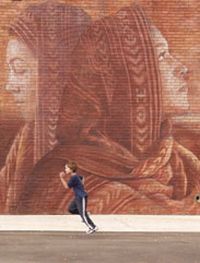 Janus Head Janus Head
11.1&2

Travels Inside the Archive
Robert Gibbons
Edge of Maine Editions

Beyond Time
New & Selected Work
1977 - 2007
Robert Gibbons
 The Age of Briggs & Stratton The Age of Briggs & Stratton
Peter Culley
|
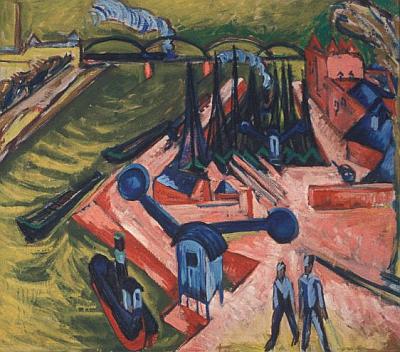
Ernst Ludwig Kirchner
1916
_______________________
The Stray Shot 2010 [pdf]
work by Gunnery Poetry Contest winner Lauren Castaldi; translations from the Chinese of the poet Haizi, by Yuze Sun; poems by ASAP-honored and IMPAC/CSUS-recognized poet Alejandro Castro; and poems by Thom Hart, whose work appears in Connecticut Student Writers at UConn-Storrs. The issue also contains fantastic work by Isabel Levy-Nance, Chaoyang Liu, Zaid El-Fanek, and many other fine writers and artists. _______________________
It struck me that above all else Dave was incredibly isolated. He was among people who had no sense of the military culture that had shaped him, and no means for understanding the traumatic events he had been through. Even the counsellors and therapists were not in his league. They were benign, soft spoken, nurturing presences promoting sleep, nutrition, exercise, relaxation, and the spiritual wonders of the twelve steps to recovery.
The Enemy Inside
Is the Canadian military prepared for the mental health consequences of our deadliest conflict since the Second World War?
Daniel Baird walrus
_______________________
Canadian Studies
summer reading in Walrus
New fiction by Lisa Moore, Linden MacIntyre, Rawi Hage, Heather O’Neill, Zsuzsi Gartner, Stephen Marche, Michael Winter, Miguel Syjuco, and Madeleine Thien; with poems by David McGimpsey
_______________________

Ernst Ludwig Kirchner
d. June 15 1938
Self-Portrait, c. 1928
_______________________
David Markson
1927 - 2010
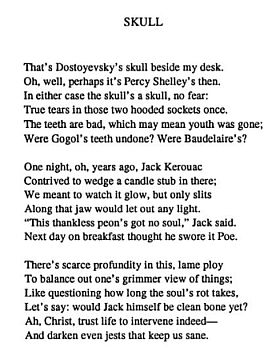
Markson on google books
Wittgenstein's Mistress
David Markson
This is not a novel
David Markson
Collected Poems
David Markson
David Markson: An Introduction
Derik Badman MadInkBeard
Interview with David Markson
conjunctions
_______________________
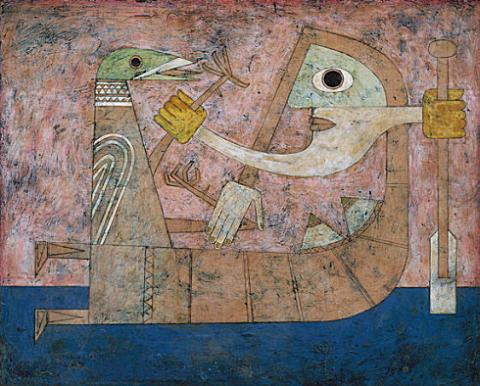
Consciousness of Shock
1951
Victor Brauner
b. June 15, 1903
_______________________
Wittgenstein's Voice: The Sound of the Unsystematic
Marjorie Perloff, Tom Pepper, Rosmarie Waldrop, and Sissi Tax in conversation,
moderated by Jean-Michel Rabate
Slought
98 m
"After several unsuccessful attempts to weld my results together into such a whole, I realized that I should never succeed. The best that I could write would never be more than philosophical remarks; my thoughts would be soon crippled if I tried to force them on in any single direction against their natural inclination."
-
Ludwig Wittgenstein, Preface to Philosophical Investigations
Wittgenstein's Voice takes the form of a conversation between preeminent American and Austrian writers, artists, and thinkers, with the aim of examining the specific voice of Ludwig Wittgenstein (1889-1951)--a philosopher that has inspired so many poets, writers, and artists active today. Wittgenstein's philosophy presents a way of thinking, but not necessarily a system of thoughts. In this sense, his way of thinking, his anti-systematic attitude, can be defined as an experimental disposition in the manner of John Cage's experimental music or even Karlheinz Stockhausen's compositions, for whom composing is "not something preliminary, but rather a permanent condition."
The conversation is inspired by David Markson's novel Wittgenstein's Mistress, a book that explores Wittgenstein's thinking through the texture of his philosophical universe, rather than through recourse to his biography. In particular, the conversation will focus on the impact of Wittgenstein's aesthetics on modern literature and the arts.
_______________________
Language as Gameplay: From the Oulipo to the Jew's Daughter
a lecture by Brian Kim Stefans at the Kelly Writers House, January 22, 2008
PennSound
_______________________
Five Prose Poems, And Some Canned Tomatoes
John Olson
alligatorzine
My Favorite Emotion
My favorite emotion is feeling cosmically anonymous. Anonymity is sweet. Sweeter than fame. Though I have never been famous so I can’t really comment.
My second favorite emotion is crystallizing into a mind. It hangs inside my head, twinkling like a chandelier.
Is consciousness a product of emotion?
I doubt it. Knowing how to solve a quantum equation involves some emotion, I am sure, but the actual mechanics do not require any feeling.
Maybe a lawnmower, or chalk. Blackboard. Logarithms. Hyperbolic geometry, unicorns, and photons.
When humanity gets excited or puzzled about a tornado or hurricane, or dying, or sexual reproduction, they invent a deity to explain it. This is called the Creation Myth.
I believe we all crawled out of a garage swarming with words.
Some of us took wing, and some of us found refuge in cartoons.
Licking lyrical wounds.
I believe the goal in life is to make as much money as possible, pile it up in a corner, and set fire to it.
It is vital to develop a relationship with one’s body that is based on respect, masturbation, and candy.
Falling in love is helpful. Falling in love expands your options. You can live among the Mongols and marry a beautiful Mongolian woman, and travel from yurt to yurt with a team of reindeer, or learn to play bass and join a rock ‘n roll group.
Or invent something. Invent a sneer. A new kind of smirk. Taunt, gibe, wisecrack.
Merge with the world. Become a cockatoo. Listen to the stars. They groan as they lift the night into the world. And hijack infinity with a fierce and ruthless silence.
The goal in life is to rejoice in geese, eat watermelon, and avoid being a nuisance.
...(more)
_______________________
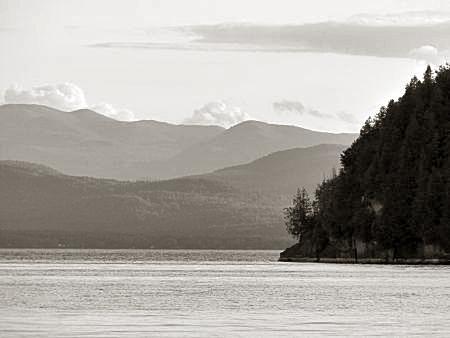
Lake Champlain
Burlington Vermont
_______________________
The Lake
Mihai Eminescu
d. June 15, 1889
Water lilies load all over
The blue lake amid the woods,
That imparts, while in white circles
Startling, to a boat its moods.
And along the strands I'm passing
Listening, waiting, in unrest,
That she from the reeds may issue
And fall, gently, on my breast;
That we may jump in the little
Boat, while water's voices whelm
All our feelings; that enchanted
I may drop my oars and helm;
That all charmed we may be floating
While moon's kindly light surrounds
Us, winds cause the reeds to rustle
And the waving water sounds.
But she does not come; abandoned,
Vainly I endure and sigh
Lonely, as the water lilies
On the blue lake ever lie.
- Translated by Dimitrie Cuclin

P.E.I.
photo - mw
_______________________
There is a tide in the affairs of men.
Which, taken at the flood, leads on to fortune;
Omitted, all the voyage of their life
Is bound in shallows and in miseries.
On such a full sea are we now afloat,
And we must take the current when it serves,
Or lose our ventures.
-
Brutus, Julius Caesar Act 4, scene 3
_______________________
from Thread
Michael Palmer
boston review
(....)
It is the role of the lovers to set fire to the book.
In the palm garden at night they set fire to the book
and read by the light of the book.
Syllables, particles of glass, they pass back and forth in the dark.
The two, invisible—transparent—in the book,
their voices muffled by the book.
It is the role of the lovers to be figures of the book, the
illegible book,
changing as the pages turn,
now joined, now clawing the fruit from each other’s limbs,
now interlaced, now tearing at throat and vein,
then splayfoot, then winged, then ember,
as the music of the book,
rustling through the palms,
instructs.
...(more)
Michael Palmer at The Poetry Foundation and Poetry International Web
_______________________
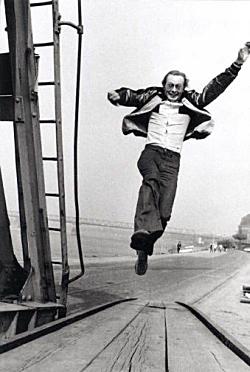
Sigmar Polke
13 February 1941 – 10 June 2010
photo - Angelika Platen, 1971
1 2 3
Sigmar Polke: back to postmodernity
By David Thistlewood, Anne MacPhee, Sigmar Polke
google books Sigmar Polke: History of Everything
_______________________
Autobiography
Robert Creeley
I've spent all my life with a nagging sense I had somehow the responsibility of that curious fact, that is, a substantial life, like a dog, but hardly as pleasant, to be dealt with no matter one could or couldn't, wanted to or not. This must be what's thought of as Puritanism, a curious split between the physical fact of a person and that thing they otherwise think with, or about, the so-called mind. I kept thinking of possible qualifications therefore, like Duchamp's "Besides, it's always the others who die..." or Wittgenstein's "Tell them it's been wonderful..." Even Goethe's "More light!" seemed a fit echo of what was, presumably, a decent wish to stay with it.
Anyhow I have no reifying memories that tell me this is where I was then and there. They are far more echoes, that came or come to me, a sense of shadow, or the comforting poignancy of old affections. "A cigarette that bears a lipstick's traces..." like they say. Charles Olson had told me years ago that the first imagined sign for self in such language as had record was a boat, and that made an adamant if harsh sense - much as Noah's Ark did. The great flood of seeming chaos had only one apparent agency for its signifying order, and that was oneself, that verifying agency without equal, because it was the one and only one for each of us. "Mine eyes have seen the glory, etc." Who could argue with that?
Now it is attractive to suspend a life as an afterthought, a well-earned pleasure of discretion and justifiable revision, just that one has lived long enough to see the time precedent as a cause of the present, a reward, as it were, for having lived long enough to know the value of such fact....(more)
via Peter Culley_______________________
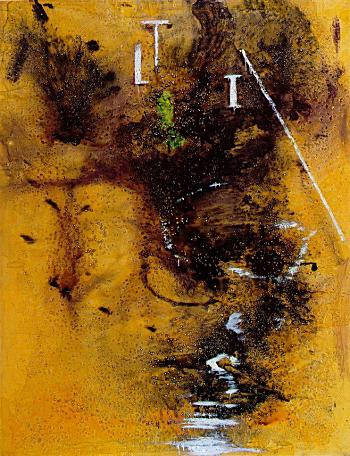
Lingua Tertii Imperii
Sigmar Polke
1983
_______________________
The Truth According to Hermes: [pdf]
Theorems on the Secret and Communication
François Laruelle
Translated by Alexander R. Galloway
Parrhesia
(....)
4. Next to the unitary and authoritarian Hermes, there is another Hermes. He defines the essence of truth as a secret, but as a secret that in order to exist and to be made known needs none of the light of logos, none of the tricks of meaning, the strategies of interpretation, the horizons of the World, or the transcendent forms of appearance. Truth as secret exists autonomously prior to the horizontality of appearance. The secret enjoys an absolute precedence over interpretation; it is itself the Uninterpretable from which an interpretation emerges. It is the invisible that has never been visible because it is known from the outset to be invisible. The essence of the secret does not reside in a rupture or redrawing that de-limits presence via some kind of withdrawal or “retrocession.” That the secret has never appeared in the horizon of presence is simply an effect, the effect of its positive essence.
5. The transcendental definition of the secret--that is, its real, and not even its nominal or ideal definition--is the following: the secret is the strictly unreflected upon form of truth that, given to itself, gives nothing of itself and receives nothing of itself except the modality in which it is given. This is only possible if it is the One or the Indivision, the Without-division, which is given to itself in its specific (that is, indivisible) modality. The secret is the veritas transcendentalis itself as finite.
6. The secret is truth when it no longer needs to go out of itself and be for itself, when it is itself by staying in itself. It is inalienable within a presence or a transcendence, within an alterity or a nothingness. The secret is index sui prior to any indication, it has never emerged into the light of a logos. It is an immediate transcendental given, an immediate that is absolutely pre-dialectical and pre-differential, pre-Hegelian or pre-Heideggerian. The secret is non-positional (of) itself, unreflected upon; it never reaches a consciousness, or vanishes when it does.
Parrhesia, Issue 9 (2010)via Infinite Th0ught
_______________________
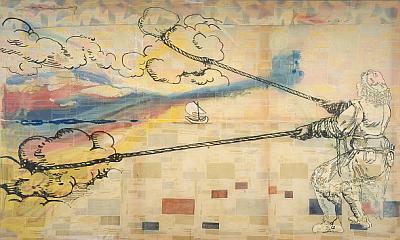
Hope is: Wanting to Pull Clouds
1992
Sigmar Polke
_______________________
OCHO 30
edited by Didi Menendez
via Nick Piombino
_______________________
When books have all seized up like the books in graveyards
And reading and even speaking have been replaced
By other, less difficult, media, we wonder if you
Will find in flowers and fruit the same colour and taste
They held for us for whom they were framed in words,
And will your grass be green, your sky be blue,
Or will your birds be always wingless birds?
-
Louis MacNeice
via Steamboats are Ruining Everything
_______________________
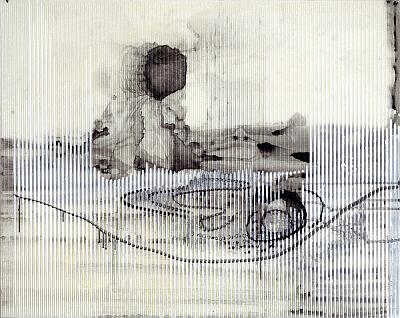
Sigmar Polke
_______________________
Immaterial Value and Scarcity in Digital Capitalism
Michael Betancourt
ctheory
.....................................................
Digital Inflections
CTheory Global Online Seminar on Critical Digital Studies
June 17, 1pm PDT (Pacific Daylight Time), 3pm EDT
(Eastern Daylight Time)
We have invited Michael Betancourt, author of a new CTheory article -- "Immaterial Value and Scarcity in Digital Capitalism," to present his work related to the future of digital capitalism. Commentaries will be provided by Arthur Kroker, co-author of _Data Trash: The Theory of the Virtual Class_, and Simon Glezos, postdoctoral research fellow at the Pacific Center for Technology and Culture. We invite your participation in this global discussion of the contemporary economic crisis.
Theme: The common thread in the periodic, convulsive meltdown of contemporary capitalism is a radical transformation in the nature of capitalism itself, from material value to a future of immaterial value, from a history of financialization to the specter of automated trading systems seemingly beyond human control, from production to the illusion of "accumulation without production."
Circulating like a virus, the wild ride of digital capitalism brings whole continents to their financial knees: the housing bubble in the USA, the crisis of Euro-debt now, and incipient changes in China's economy next. No country is exempt, no individual untouched, no society unaffected, no empire immune. History is on the move once again, and digital capitalism is at once its talisman and casualty report.
Are we entering a new era of capitalism under the sign of "semiotic manipulation," run by software programs that quickly accident whole marketplaces, accelerated by the dream of accumulation without production, in essence, a new regime of affective capitalism driven forward by the regime of computation?
-
Arthur and Marilouise Kroker, Editors, CTheory Pacific Centre for Technology and Culture
_______________________
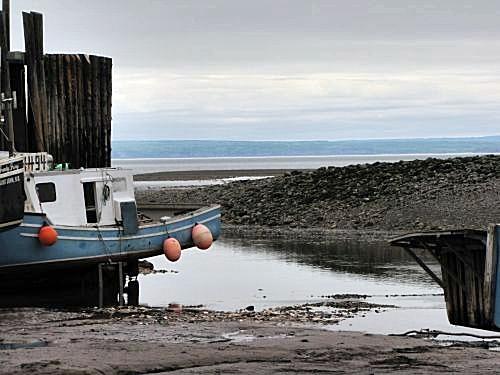
Alma
Bay of Fundy
photo - mw
_______________________
The four points of the compass
Viktor Horváth
excerpt from Török tükör
Translation by Judith Sollosy
eurozine
The northern gate is the Demir Kapi, the Iron Gate. On that particular spring, when I was thirteen and a half, they kept warning me against it all the time, lest I lose my escorts and take it into my head to wander outside the gate and sneak out of the city. No wonder that I ended up imagining that a murky and terrifying world lay outside the Iron Gate, where in the green mist of the vast forests the ground opens up under your feet, or wild beasts tear you to shreds, and where base hearted ifrits dwell and mighty, evil magicians come out of their stone caves to challenge Allah's angels. I was much frightened by this tale, which I had coloured and amplified, and now I know that it was no tale. I'd been in Pécs two years already when I made a habit of wandering through the hills, laughing with relief at my former childish fears, whose flames were fanned by Halíma and Anna, because they feared for my safety. But in the space of that one summer I realized that it was all true, though admittedly, by then I was no longer a child. The djinns that escaped from the valley of the Mecsek clashed with Allah's angels, and to this day I don't know who came out the winner. ...(more)
|
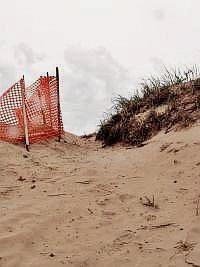
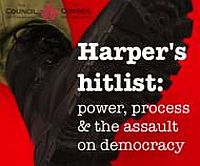

 Janus Head
Janus Head

 The Age of Briggs & Stratton
The Age of Briggs & Stratton









